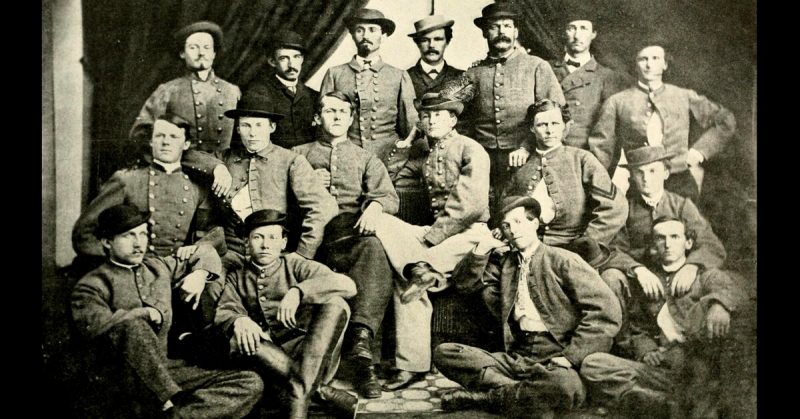

At the beginning of the Civil War in 1861, Washington had many Southern sympathizers. In April 1861 when Virginia seceded, before it had officially joined the Confederacy, the state’s governor John Letcher, who was also a former congressman, set up a spy network in the nation’s capital. He started by recruiting Southern supporters like Thomas Jordan and Rose O’Neal Greenhow.
Once, Greenhow sent reports about plans for a Federal invasion to Jordan, who then passed the information on through couriers, one of them being Bettie Duvall, who was disguised as a farm girl to pass by Union sentinels and eventually deliver the message to Confederate Officers at a Fairfax Courthouse in Virginia. Later Confederate General P.G.T. Beauregard claimed the information helped his rebel army win a surprise victory in the First Battle of Bull Run. This demonstrates how impactful military intelligence was during the Civil War.
The Confederate Signal Corps, a military communication system, set up the Secret Service Bureau. This organization was headed by William Norris and managed a system of couriers known as the “Secret Line”. This system was used to carry intelligence from Washington to Confederates in Richmond. They also sent coded messages to Confederate officials in other locations such as the North, Canada, and Europe. Some Confederate soldiers, like J.E.B. Stuart and John Singleton Mosby, also known as the “Gray Ghost”, served as scouts for the rebel cause.
Rose O’Neal Greenhow (1813 - 1864) was one of the numerous female spies who took advantage of the 19th-century stereotype that women were less able to participate in war. She utilized her social connections to learn information that was pivotal to the outcome of the war, with one of her most important messages helping General P.G.T. Beauregard win the First battle of Bull Run. She was also sent on a mission to Britain and France to gain Confederate support, publishing a memoir during her time in Europe. In My Imprisonment, and the First Year of Abolition Rule at Washington, Greenhow describes her arrest, “As I have said, on Friday, August 23, 1861, as I was entering my own door, on returning from a promenade, I was arrested by two men, one in citizen's dress, and the other in the fatigue dress of an officer of the United States Army. This latter was called Major Allen, and was the chief of the detective police of the city. They followed dose upon my footsteps.” She was celebrated as an influential spy by Confederates.
/https://tf-cmsv2-smithsonianmag-media.s3.amazonaws.com/filer/88/19/88192d95-02d2-411f-bb1a-c895a6f6050d/civil-war-women-spies.jpg)
Maria “Belle” Boyd (1844 - 1900) was another female agent who carried valuable intel concerning Union troop movements and strategies to Southern recipients. Known as “the Cleopatra of Secession”, she began spying at 17 years old. She once shot a Union soldier who had insulted her mother and was arrested twice. She also worked as a courier for Confederate generals Thomas J. "Stonewall" Jackson and P.G.T. Beauregard. Jackson claimed the intelligence Boyd provided helped him win battles during the Shenandoah Valley Campaign of 1862. In her memoir In Camp and Prison, Boyd describes how her courier delivered the message that led to the victory of Bull Run, “A few days before the battle of Bull Run a country market-cart stopped in the Confederate lines, at the door of General Bonham's tent. A peasant-girl alighted from the cart and begged for an immediate interview with the General. It was granted. ‘General Bonham, I believe?’ said the young lady, in tones which betrayed her superiority to the disguise she had assumed. Then, tearing down her long, black hair, she took from its folds a note, small, damp, and crumpled; but it was by acting upon this informal despatch that General Beauregard won the victory of Bull Run.” Although she was not universally celebrated for her flamboyant behavior, she had a large impact on the war through her espionage. She later gave lectures in which she described her adventures as a Confederate agent.
Elizabeth Van Lew, known as “Crazy Bett", was a bold woman who passed on information concerning Confederate strategies and movements and took part in the Underground Railroad. She was one of the most famous female spies to gather meaningful intel for the North. Also, after her husbands death, she secretly granted freedom to mary Mary Elizabeth Bowser, who went on to become a succesful Union spy, as well as other enslaved people. In addition, her and Mary Elizabeth Bowser teamed up to spy on Confederates, one of them being President Jefferson Davis himself.
Antonia Ford provided military intelligence to Confederate cavalry general J.E.B. Stuart by gathering information from Union soldiers who lived in her hometown at the age of 23. In March 1863, Ford was accused of spying for John Mosby and eventually arrested, although she was later released due to the petition of Union major joseph C. Willard, who she married soon after.
:focal(155x109:156x110)/https://tf-cmsv2-smithsonianmag-media.s3.amazonaws.com/filer/Civil-War-spies-Antonia-Ford-6.jpg)